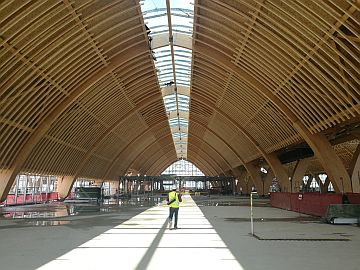
Work continues on the new Mactan-Cebu International Airport terminal, which is targeted to be completed in 2018. The new terminal is one of the reasons foreign investors see Cebu as a favorable investment destination.
CDN FILE PHOTOCDN FILE PHOTO
Fujitsu, latest foreign firm to open satellite office here
Despite lower year-to-date inflows of foreign direct investment (FDI) to the Philippines, local business stakeholders believe that Cebu is resilient to this development and still remains a favorable investment destination.
Cebu Chamber of Commerce and Industry (CCCI) president Melanie Ng said Cebu is strategically located at the center of the archipelago and is rich with talent resource produced by high-quality universities, making it an attractive area for investment.
“Coupled with infrastructure development like the opening of the new airport terminal building next year and upcoming transport network developments, we are poised to attract more investors in the coming years,” Ng said in a text message to Cebu Daily News on Monday.
Fujitsu expands
The latest foreign player to establish a presence in Cebu was Japanese information and communication technology (ICT) company Fujitsu, which opened an office at the Cebu Business Park last October 11.
Its satellite office is an extension of its Global Delivery Center in Manila, from which the company delivers extensive services in remote infrastructure management, service desk, application services, and business process outsourcing primarily to customers in the Asia Pacific region, North America, Europe, the Middle East, India, Africa and Oceania.
In a statement, Fujitsu said its office here would create up to 400 new highly-skilled positions.
The company said sophistication of local technical and language skills prompted them to expand to Cebu in addition to their existing facilities in Manila.
Japanese speakers
“The high proportion of Japanese speakers in the region was another key factor in Fujitsu’s decision to choose Cebu and to create 400 new positions over there in the next two years,” the company said.
For its Cebu operations, the firm said it will focus on supporting customers in Japan with business application development.
Joel Mari Yu, Cebu City’s consultant on business and economic development, said Cebu has a sure-sell niche which makes it an excellent world-class destination for customer service activities.
Yu earlier said that schools needed to ensure they are only producing the best for the workforce, particularly for the information technology-business process management (IT-BPM) industry, as it moves toward hiring more high value-skilled workers.
The IT-BPM sector remains to be among the major drivers of growth for Cebu, with over 150,000 employees within the metropolitan.
For Roy Soledad, head of the Cebu Investment and Promotions Office, Cebu is still a favorable investment area despite the decline in national statistics.
“Investors do their own study too, and as long as they find areas like Cebu favorable for their investment, they will go,” he said.
Inflow of FDIs
The net inflow of job-creating FDI in the first seven months of 2017 continued to fall behind a year ago levels, dropping 16.5 percent to $3.904 billion, according to the latest Bangko Sentral ng Pilipinas data.
In a recent Inquirer report, FDI in July alone declined by a faster 37.9 percent to $307 million from $493 million in the same month last year as well as reversing the 182.7-percent year-on-year jump posted in June.
The BSP data showed that the July FDI figure was the lowest monthly inflow in 13 months or since June last year’s $238 million.
The state planning agency National Economic and Development Authority, in a statement, claimed that while FDI inflows were lower year-to-date, “foreign investors remain confident to do business in the Philippines.”